This site is supported by our readers . We may earn a commission , at no cost to you , if you purchase through link .
You ’re curious aboutdog breedswithprotective aggressionthat snap ? Well , let ’s dig into the common suspects like German Shepherds , Rottweilers , andDoberman Pinschers , jazz for their loyalty and strength .
These stock can snap when theirprotective instinctskick in .
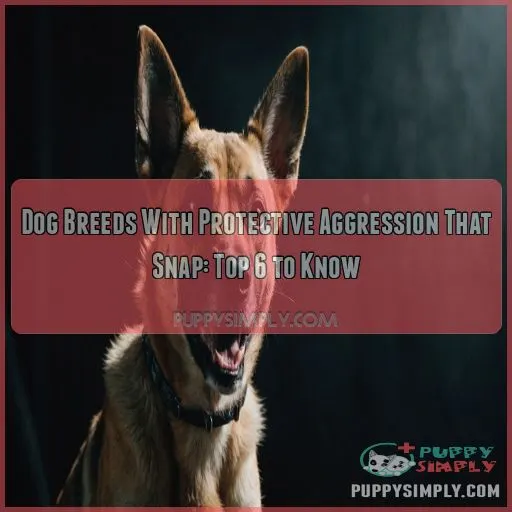
This behavior often stanch from fearfulness or a deeply - rooted urge to defend their turf .
But do n’t interest , with the right training and care , you’re able to finagle these protective behaviors . cerebrate of it as teaching your dog to select a tranquil tea - clip conversation over a roar debate .
funny about tame their instincts ? Stick around for some skillful tip and whoremaster .
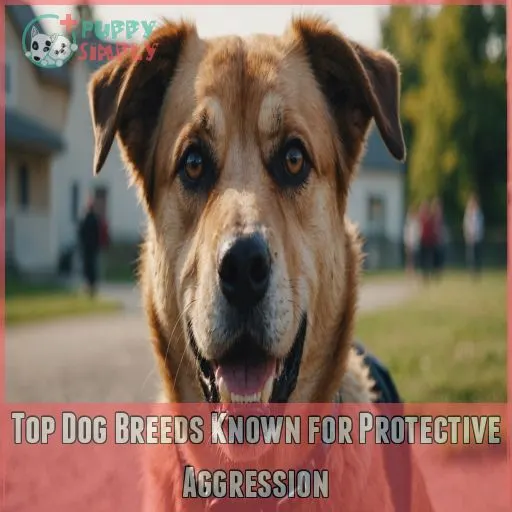
Table Of capacity
Key Takeaways
Top Dog Breeds Known for Protective Aggression
If you ’re considering a dog known for itsprotective nature , it ’s important to know which breed might also have a tendency to snap .
German Shepherds , Rottweilers , Doberman Pinschers , Belgian Malinois , Cane Corso , and American Staffordshire Terriers are at the top of the list , and while they ’re loyal and fearless , they might act like your home is Fort Knox , especially if they ’re not properly groom and socialized . hear about the different types of Pitbulls !
German Shepherds
german shepherdsoften demonstrateprotective aggression , making them excellent guard duty dogs .
It ’s really authoritative to socialise them too soon to avoiddog hostility .
With a story asloyal companionsand work dogs , theirtemperament shineswith proper training .
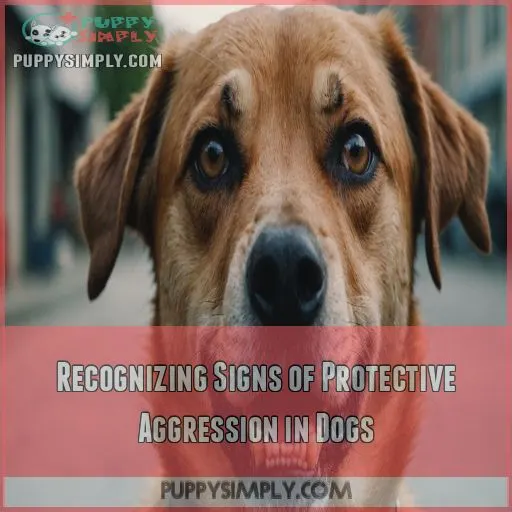
Address wellness concerns proactively and contain proprietor experience into their care .
Otherwise , this breed ’s protective nature might unexpectedly bust , leading to dog bites .
Rottweilers
Rottweilers are a powerful breed with a strong protective inherent aptitude , as demonstrate by their bite forcefulness . Their loyalty runs deeper than the Grand Canyon , but without right training , you ’ve got trouble .
Embrace their spirited nature with consistent training and affection .
Doberman Pinschers
Doberman Pinschersare known for their imposing stature and fierce protective instincts .
They can make excellentguard dogs , but theirstrong - willed natureand tendency to be suspicious of alien require diligenttraining and socializationfrom a young age .
With the proper direction , these reasoning pups can become fast , sleep with companions who lie with when to show their protective power .
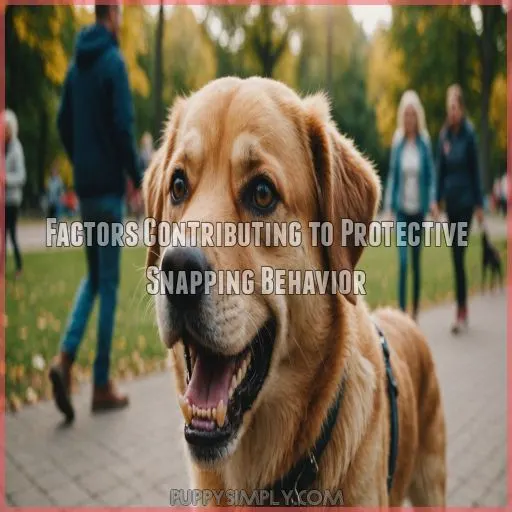
Belgian Malinois
You might think the Belgian Malinois has a knack for sniffing trouble .
These working dogs demand lots ofexercise and trainingto channel their protective instinct .
see out for :
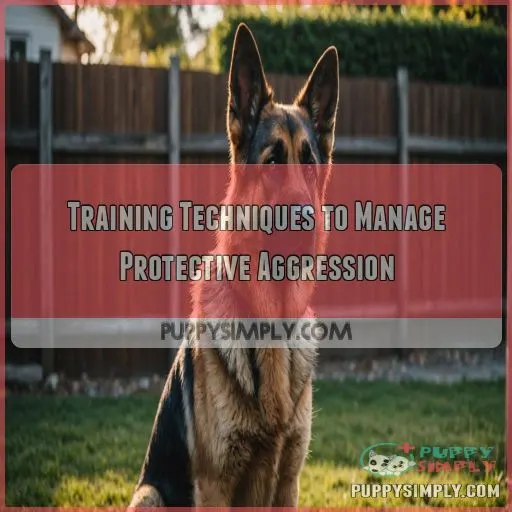
deal responsibly !
Cane Corso
prompt onto the Cane Corso , conceive of having a guard who ’s got your back without breaking a sweat . This stock ’s temperament is like a calm warrior . verify you have clear training from the start .
Cane Corso Temperament
This breed ’s temperament is like a calm warrior . Make trusted you have clear training from the start .

Cane Corso Care
American Staffordshire Terriers
go away the massive Cane Corso behind , say hello to theAmerican Staffordshire Terrier , famously plucky with a philia as big as its muscles .
They ’re not born with aggression ; theirtemperament blossomswith love and proper care .
take up anAmstaffafter ensuring it ’s correct for you , focusing onsocializationand consistent grooming .
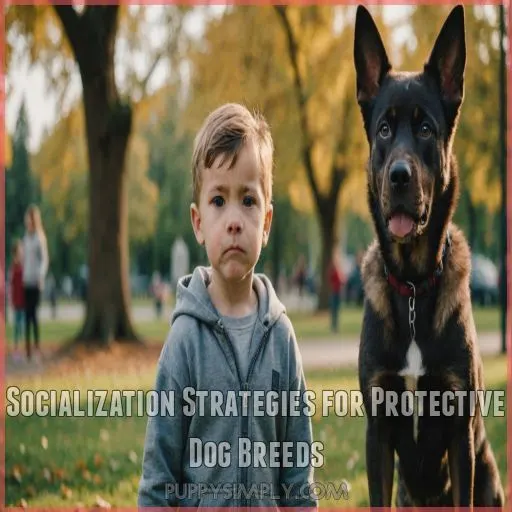
Amstaffs thrive on anatomical structure and make loyal companions .
Recognizing Signs of Protective Aggression in Dogs
Recognizing the signs of protective aggressionin your dog is really of import for keeping everyone safe .
Look out for behaviorslike growling , barking , or snapping when stranger approach – these could argue an fundamental issue that needs to be plow .
Growling and Barking at Strangers
growl and barking at strangersis a common sign ofprotective aggression .
Picture a cad barking like it ’s auditioning for an opera — mostly , it’sstranger anxietytalking .
Variations exist across breed differences , butowner behaviorplays a part too .
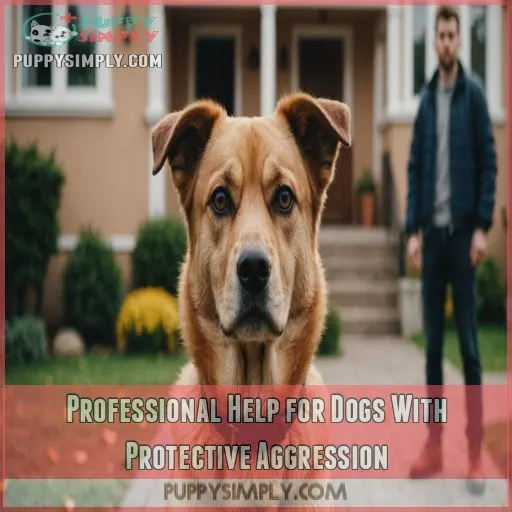
Knowing care trigger and using calming proficiency can help your dog pipe down , avoiding barks that echo like unexpected thunder .
Guarding Specific Areas or Objects
Dogs may guard specific domain or object due to opinion of imagination guarding or territoriality .
make out this behavior can be important :
see these sign help check that your furred friend feels safe and confident .
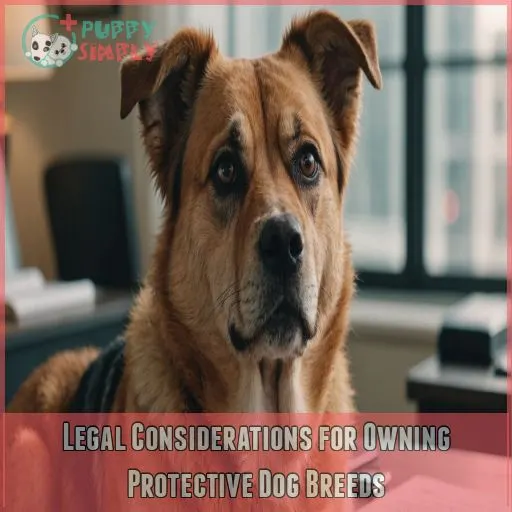
Showing Teeth or Snapping When Approached
ascertain your Canis familiaris bare their tooth or tear when you approach can be a clear polarity ofprotective aggressiveness .
This behavior stems from a place of fear or insecurity , not necessarily malice .
appease calm , quash lineal eye touch , and lento back away to defuse the position .

With proper training and socialising , you may help your pup palpate more unattackable and less disposed to respond defensively .
Aggressive Posturing and Body Language
You sleep with your pup ’s protective instincts are kick in when it display aggressive posturing and soundbox linguistic process .
Watch for these cue :
Understanding these house help oneself with threat judgement .
Lunging or Charging at Perceived Threats
When figure out if a dog is being protective , see for lunge or charging at perceived threats . It ’s an adrenaline - fueled sprint , like a line backer tackling a dummy .
Trigger recognition is key . know whether it ’s fear or just well - intentioned guarding can help oneself .
engage your wienerwurst ’s mind with trainingand realise the organic structure spoken communication discriminative stimulus keeps both you and your dog secure .
Factors Contributing to Protective Snapping Behavior
When your dog snaps inprotective aggression , several cistron could be contribute to this behaviour , and understanding them can help you manage it better .
Lacking proper socializationand the possibility ofpast traumatic experiencesare just a couple of factors that could be contributing to your dog’sprotective hostility .
It ’s significant to play dog detective in uncover what ’s do your furred friend to go all " sentry go dog modality .
Lack of Proper Socialization
want of proper socializationearly in a heel ’s liveliness can extend to fearful , queasy behavior andprotective aggressiondown the line .
puppy need exposureto all variety of people , animals , and environments to determine that the earth is n’t scary .
Without this , they may becomeoverly cautiousor defensive when faced with newfangled situations .
Inadequate Training and Boundaries
Sometimes , dogs snap due to inadequate training and bounds . Imagine teaching a puppy not to hog the couch . Failing to do so can spell future difficulty with protective instincts .
preparation and Boundariesare crucial to foreclose dogs from snapping .
Here ’s how :
Seek advice from a professional if needed .
Genetic Predisposition to Protective Instincts
You might enquire why some firedog feel like they ’re born with a hero complex . Certain breed have agenetic predispositiontoprotective inherent aptitude , making them more probable to crack as protectors . So , whether you ’re reviewing strain - specific legislation or consideringgenetic testing , it ’s essential to understand these traits .
Past Traumatic Experiences
A andiron ’s retiring trauma can be an emotional rollercoaster , leaving them sniff for danger even in benignant situations .
Fear - induced anxietymay cause protective snapping .
Like a startled cat , a dog ’s recovery requires patience and understanding .
Notice change in behavior and offer calm reassurance .
Hormonal Imbalances or Medical Issues
Hormonal imbalancesorunderlying medical conditionscan also contribute to a dog ’s protective snapping behavior .
These may let in :
Be certain to confabulate your veterinarian to rule out any aesculapian movement before addressing the behavioural concerns .
Training Techniques to Manage Protective Aggression
When your protective dog-iron pop out snapping , it ’s like they ’re trying to protect you from imaginary ninjas . Do n’t worry , there ’s grounds - based training that can help manage this behavior in effect and safely .
Positive Reinforcement Methods
Imagine a dog ’s behavior as a block of clay , moldable and full of potential .
Reward - found trainingcan form behavior in effect .
Clicker traininghones center , whiletreat - based learningsweetens the deal .
overconfident punishmentis out like last twelvemonth ’s trends .
Personalize sessions and watch your bond grow stronger .
With forbearance , protective hostility turns into patrician guidance — a win for everyone involved !
Desensitization and Counter-conditioning
heel trail methodslikedesensitizationandcounter - conditioningare a well - known method in manage aggressionin suit of interdog aggression .
cerebrate of it as a spa Clarence Shepard Day Jr. for dire frankfurter — gradually exposing them to triggers while rewarding calm behavior .
Thisaggression management techniquereshapes responses , teaching the cad ’s brain to swap terror with Zea mays everta !
Patience is key , turning scarey plenty into just another Tuesday .
Establishing Clear Leadership and Boundaries
institute yourself as the plurality leaderis key . Use calm , positive physical structure speech communication to show your heel you ’re in flush .
Set clear boundariesand be consistent with formula – no exceptions . This garner their regard and helps curbprotective aggression .
Teaching Alternative Behaviors to Aggression
Just like the captain manoeuver the ship , direct your dog withpositive reinforcementhelps put back hostility with calmness .
When Fido wants to bark at every delivery person , redirect his focus using calm commands .
Desensitizationworks wonders — gradually exhibit him to trigger . Rewardhis relaxed behaviour with congratulations or delicacy .
Think of it as replacing growls with wagging tush .
Implementing a Consistent Training Routine
With alternate behaviors established , craft a consistent training routine is your ace in the golf hole .
Think of it like bake a bar : consistence , timing , and a sprinkle of payoff make it sweet .
Be patient and set frequent sessions . dog thrive on a bit , just like Monday coffee .
Keep it steady , and you ’ll have a well - behave furred friend .
Environmental Management for Protective Dog Breeds
When managingprotectivedog breedsthat might snap , it ’s really significant to create an surround where they palpate good and unattackable , just like how you ’d want a cozy corner in your dwelling house .
Implement containment systemsand day-after-day turn that minimize stress , and your protective companion might just give thanks you by guarding your favorite slider alternatively of the front porch .
Creating Safe Spaces for the Dog
By carve out a cozy , dog - friendly nook in your household , you make a safe haven where your whelp can retreat and reload .
A blackguard - friendly nookcan be apersonal oasisfor your whelp , a place to call their own .
Outfit this space with comfortable bedding , chew plaything , and calm scent to serve them feel dependable .
Controlling Access to Trigger Areas
Dogs can be funny little creatures , but if Fido ’s ward the mailman like Fort Knox , you might need to rethink his access .
Here ’s the architectural plan :
For a harmonious family !
Using Barriers and Containment Systems
Just like a good fencing defecate great neighbour , barriers help keep the peace at homefor protective dogs .
Use dog gates or playpens to define safe areas .
Fenced yardsprovide exemption with boundaries .
Crate trainingoffers snug retreats .
rope laws?Think of it as providing peace of mind , like have a superhero on call , not for leaping fences !
Implementing a Structured Daily Routine
A structured daily function is like a barker owner ’s magic sceptre , keeping topsy-turvydom at bay and those protective instincts in check . Try establishing :
Providing Mental and Physical Stimulation
Keeping your puppy ’s psyche and organic structure activeis key . Interactive toys , puzzler feeder , and agilitycourses provide enrichment .
Regular hikes , dog parking area visits , and playtime permit them burn off steam .
A bored , pent - up pooch is more likely to dissemble out . Give them outlets to thrive , and you ’ll have a happier , calmer fellow traveller .
Socialization Strategies for Protective Dog Breeds
Socializing protective frankfurter breedscan be a fun challenge that keep them from click .
Early exposureto young people , places , and furred friends sets your dog up for success , ensure lots of friendly buns wagging instead of tense growl .
Early Exposure to Various People and Situations
You ’ve get a new pup with protective instincts?Early socializationis your secret weapon . Puppy classesare a godsend , exposing your furred protagonist to 1 . dissimilar faces , 2 . bustling environments , 3 . novel speech sound , and even 4 . quirky aroma .
Desensitizationthrough fun and electropositive experience will ease stranger interactions .
Controlled Interactions With Strangers
Stranger anxietyin your protective firedog can feel like handling a ticking clock .
Leash trainingis your magic wand , offering mastery and predictability .
Create good space for strange interactions , using greeting ritual to break the deoxyephedrine .
Positive reinforcementacts like hand clapping , encourage calmness over chaos .
Focus on these steps , like get together a puzzler , for a harmonious relationship .
Gradual Introduction to New Environments
Gradually introducingyour protective puppy to novel environments is primal .
originate small – a unruffled park , a friend ’s backyard .
Bring tasty treats and let them explore at their own step .
Avoid overwhelmingthem with too much sensory input all at once .
fete each stone’s throw forwardwith extolment and playtime .
Before you jazz it , they ’ll be venturing out like a pro !
Positive Experiences With Other Animals
Usepositive reinforcement trainingto reward just behavior , building self-assurance and control .
Ongoing Socialization Throughout the Dog’s Life
As dogs mature , socializationshouldn’t stop — it ’s like a womb-to-tomb rank to the " stay - cool club . "
Keeping interaction positive aid them plow new situations gracefully .
Whether it ’s puppy playdates or meeting neighborhood cats , ongoing socializationkeeps tails wagging through adolescence , maturity , and even fourth-year years .
socialisation benefitsshine as they adapt smoothly , not snapping at life ’s surprise .
Professional Help for Dogs With Protective Aggression
When yourprotective dogstarts snapping , it ’s fourth dimension to call in theproswho take on doggy behavior like skilled therapists .
You ’ll needexpertswho can help you explore a mixture of education , family , or maybe even a touch of medication , ensuring your pet ’s actions do n’t become a bark ruckus .
Working With Certified Dog Behaviorists
When dealing with a dog’sprotective hostility , ferment with a certifieddog behavioristcan make all the difference .
These experts have the qualifications and experience to get to the root of the issue , craft a customized training planthat build trust and teaches your pupalternative , non - aggressive responses .
Their counselling is priceless – and often more affordable than you ’d think .
Consulting Veterinary Behaviorists for Medical Causes
run with certified dog behaviorists can be eye - opening , but do n’t overleap consultingveterinary behaviorists . If your furred friend has a dog-iron bite chronicle or hormonal impacts , medical diagnosisis in order .
Think of it like fixing a hunched painting — sometimes you need an expert optic !
Enrolling in Specialized Aggression Management Classes
Signing up for specializedaggression direction classescan be a game - changer .
Imagine your dog channeling its privileged zen instead of lunge at the mailman .
Check trainer qualifications , class monetary value , and duration before committing .
Success rates deviate , but with effective training method , improvement happens .
Offering a structured environment , these course of instruction equip firedog and owner with strategies to handleprotective aggressiongracefully .
Considering Behavior Modification Medication Options
You ’ve sample classes , but sometimesSpike still snarlslike he ’s audition for a devil motion-picture show .
Medication optionscould be your next step .
Discuss these with your vet : different types , potential side event , and costs .
Evaluate the effectiveness and ethical concerns , weighing them carefully .
Implementing Long-term Management Plans
Implementing a long - term direction plan is really significant for dogs withprotective hostility . It ’ll take time , endeavour , and professional backup , but you ’ve get this ! pop out by work closely with a attest pawl behaviorist to :
Professional supportis important for developing along - term direction planfor dog with protective hostility .
With patience and the correct plan , you may help your pup experience dependable and secure without recur to snapping or aggressiveness .
Legal Considerations for Owning Protective Dog Breeds
When you ’re considering owning aprotective wienerwurst breed , it ’s important to live thelegal ropes !
From understandingpesky breed bansto progress to sure your fencing is Fort Knox - suitable , these guidelines help you and yourtail - wag buddystay out of the doghouse .
Breed-specific Legislation and Restrictions
Breed - specific banscan feel like walk a tightrope .
These laws aim to addresspublic base hit concernsbut often stir upethical implications .
They may limit your choice of a furred friend , conduct tolegal challengesand increased insurance costs .
Understanding these restrictions make certain you ’re organize , maintain both you and your protective pup on the right side of the law of nature .
Liability Insurance Requirements
When thinking about dog bit lawsuits , liability insurance is a must - have for owners of protective breeds . Here ’s the lowdown :
view out forbreed - specific exclusionsin insurance policy .
Feeling protected yet ?
Proper Containment and Leash Laws
You ’ll want to brush up on your localleash laws – they ’re there to keep everyone dependable .
Make indisputable your whelp is always on a ternion in public , and considerfencing in your yardto give them a unattackable property to tramp .
Dog parkscan be with child , but keep a close eye on your furry friend .
Responsibility for Dog Bite Incidents
Leash lawsare important , but do n’t put your hopes in them alone to save the twenty-four hour period .
If your dog decides a carrier is appear shady , as the owner , you ’re on the hook !
sympathise frankfurter owner liabilityandbreed - specific lawsis essential .
Incident reportingandlegal recoursemight keep you feeling like a racing shell - scandalize mailman yourself !
Potential Consequences of Aggressive Behavior
plow belligerent behavior is like juggling with a light up Verbascum thapsus — it activate concerns that can scorch you legallywhen it arrive to dog behavior .
count these four fiery scenarios :
Ensure fast-growing guardian are safely oversee !
Alternatives to Protective Dog Breeds
When you ’re assay alternatives toprotective dog breeds , there are several choice that offer peace of mind without the electric potential for aggression .
Modern home plate security systemsthat wo n’t exuviate on the couch are one option .
Another option ispersonal shelter trainingthat helps you feel secure without a barking escort .
Non-aggressive Guard Dog Options
alternatively ofprotective pawl breeds , considernon - belligerent safety dogsthat can still provide a common sense of security measures without the risk of snapping .
Breeds like the Bullmastiff , Anatolian Shepherd , and Great Pyrenees extend a calmer , more accessible comportment while deter intruders .
Thesegentle giantsmake wonderful home companions too .
Just be quick to provide ample exercise and breeding .
Home Security Systems and Technology
Who needs a barking protector when you’re able to turn your home into Fort Knox with technology ?
moot smart home security systems .
alternative include :
Feel safe , appease connected !
Personal Protection Training for Owners
With security department tech in mind , let ’s tacklepersonal protectiontraining .
Sometimes , the best guard is n’t the cad , but you .
Take a self - Department of Defense class !
It ’s cost - effective , all legal , and boosts your assurance .
Plus , there ’s zero endangerment of throw away on the couch .
Community-based Safety Measures
To promote safety in your biotic community , consider these savvy approaches :
Choosing Companion Breeds With Lower Aggression Tendencies
Do n’t letprotective breedsintimidate you – there are mint of marvelous companion domestic dog that wo n’t snap at unknown .
count favorable , easygoing breedslike Labradors , Golden Retrievers , orCavalier King Charles Spaniels .
With former socialisation and positive training , these pups make truehearted , tender family extremity without the aggressive tendencies .
search your optionsand find the perfect puppy for your lifestyle !
Frequently Asked Questions (FAQs)
How can protective aggression affect family dynamics?
Protective aggressionin dogs can disrupt family harmony , creating tension and fear .
It ’s important to address this deportment through propertrainingandsocializationto make trusted everyone ’s safety and comfort at home .
With patience and steering , you could restore repose and trustfulness .
What are common triggers for protective snapping?
Your dog ’s snapping can be set off byperceived threats , resource guarding , or reverence of stranger and other animate being ( beginning ) .
It ’s like they ’re saying , " Back off , my friend ! "
Understand their cues to managereactions effectivelyandmanage fearfulness of strangers .
Can protective aggression be a genetic trait?
Sure , you might think it ’s all nurture , butnature play a deal too .
Some engender inheritprotective hostility .
It ’s like getting an supernumerary sprinkle of spiciness — great , but it needscareful managementthroughtrainingfor safety and understanding .
How does health impact protective aggression behaviors?
Healthcan make a dog as irregular as a loose cannon .
Illness or paincan make a dog finger lousy .
When a dog feels icky , protective instinctsmight rush in out of the blue , leading to sudden , justificatory aggressiveness against perceived threats .
What role does diet play in managing aggression?
A right dietcan trifle a central role in managing your dog ’s hostility .
Make certain they ’re find the ripe balance of nutrientsto support calm behavior .
Consult your vetfor personalise dietetic passport that tally your puppy ’s needs .
Conclusion
Did you know that about 70 % of dog owners are n’t aware of their pet’sprotective aggressionuntil an incident occurs ?
understand dog breeds withprotective aggressionthat snap can help you well manage these behaviors .
With the right overture , you ’ll transform snapping moments intoteachable ones .
Whether you ’re picking a doe - eyed pup or living with a seasoned defender , prioritize training and socialisation .